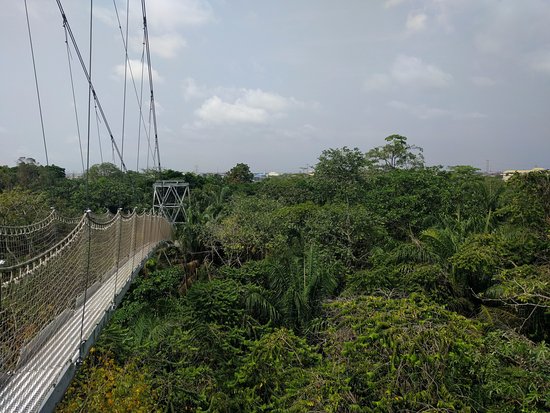Feature
Destruction of forests across Nigeria, time to stop the ugly trend

By Adeze Ojukwu
Environmentalists are petrified by the flagrant destruction of forests across Nigeria.
Their foreign counterparts are equally alarmed at the ugly trend. But the current administration seems unperturbed about this depredation.
Conservation of forested areas is on the front burner of the global agenda for climate action and green recovery.
This remarkable pursuit, to protect wildlife and biodiversity, is not only compelling, but critical to the survival and existence of humanity and the earth.
But it does seem that the Nigerian leadership and many citizens are blind to these pressing mission.
This is apparent from the raging battle for the nation’s fledgling forest reserves and the ethnic-cum-religious undercurrents triggered by the recent moves to sanitize these sites.
While other societies are making hefty investments in sustainable ecological systems by cradling these endangered territories, some nationals in collusion with foreigners, are busy hacking down plantations.
Many of these exotic settings have been converted to criminal dens for armed robbers, kidnappers, rapists, murderers and terrorists.
Sustainable management practices notably forestation, afforestation and effective legislation will definitely contribute significantly towards reducing these brazen excesses.
Several organizations including the Conservation Foundation (NCF), are opposed to the reckless cutting of trees and invasion of woodlands, because of their connectivity to global warming, ecosystem services, erosion risks, flooding, water flow and extinction of species.
Policy makers should promote public awareness about mitigation initiatives, including the ‘Green Recovery Nigeria Initiative,’ which aims at recovering about 25 percent of tree cover within the next three decades.
Thailand-based conservationist, Mr. David Owolabi said climatic mismanagement is largely due to ‘weak institutions and limited resources, as a result of lack law enforcement, as well as limited capacity for land use planning.’
Others are fuelwood, fires, overpopulation, urbanization, mining and cattle grazing.
‘In Nigeria, the legal framework is unclear or neglected, paving way for illegalities to take place, which poses a threat to the biodiversity.’
He stated this in a 2019 paper tagged: ‘Forest Loss in Nigeria, the Impact on Climate and People from the perspectives of illegal Forest activities and Government Negligence.’
Forests, he emphasized ‘provide a wide range of resources and ecosystem services such as storage of carbon, production of oxygen vital for human life, as well as regulation of hydrological cycle, water purification, protection of wildlife and absorption of toxic gases.’
According to United Nations Environmental Programme (UNEP), deforestation in Africa is twice the whole world rate, even as Nigeria ‘has lost about 96 percent of its natural forest.’
‘It is such a catastrophic situation that the country’s vegetation is disappearing. As of late 2012, nearly half of Nigeria was forested (defined as land with more than 10 per cent tree cover), but the country’s rainforests are fast declining,’ Owolabi lamented.
‘Nigeria lost nearly 80 per cent of its old-growth forests between 1990 and 2005, giving the sardonic variance of having the highest deforestation rate of natural forest on the planet during that period.’
‘Nigeria falls short of the required standard needed. FAO declared Nigeria’s forests as one of the most threatened on the planet because of the high population growth rates, conversion for subsistence and industrial agriculture, and illegal logging.’
‘Whereas in most western nations, forests are properly managed and conserved to safeguard the future but in Nigeria, priorities are accorded to managing a few forests and some national parks,’ he added.
Who is to be blamed for these lapses, but the authorities for their negligence.
Halting these degradations requires stringent policies aimed at achieving better climatic conditions and biodiversity outcomes.
But this understanding is grossly lacking, with the failure to stem the desertification in the north and the devastation of the tropical rainforest in the South.
These ancient groves have become the new trenches for wars, killings and nomadic shepherds.
‘How did we get to this point? This is the question, among most citizens, over the current debacle that has polarized the country. Gory details of dastardly acts perpetuated in these hotspots are well-known.
As migrant herders move from the arid north, to the south, in search of grass for their flock, they clash with local farmers over water and pasture.
Innocent Nigerians are dying in their droves, with the escalation of these intractable hostilities.
No part of the country is spared from these gruesome attacks and deaths, from the Sambisa forest in the North East to the Middle belt and south regions.
The land reeks of blood.
The clamour to end this onslaught can no longer be muzzled.
All people of conscience across the country and world are worried about these atrocities.
The recent move to flush out these violators, has triggered ethnic tensions.
The controversy has also resonated the dominant campaign for ranching, as the panacea for this feud.
For instance, Governor Abdullahi Ganduje of Kano has advocated establishment of laws banning movement of cows to the south.
‘My advocacy is that we should abolish the transportation or trekking of herdsmen from the northern part of Nigeria to the middle belt and to the southern part of Nigeria.’
Recall that in 2018, he appealled to the cattle breeders to take advantage of the state’s veterinary facilities and reiterated the call few days back.
‘We are building a Ruga settlement in Samsosua forest, our border with Katsina and we have succeeded in curtailing the effect of banditry in that area.’
‘We are building many houses and constructing a dam. We are establishing a cattle artificial insemination centre, a veterinary clinic and are already building houses for herdsmen.’
‘There should be a law that will ban, otherwise we cannot control the conflicts between herdsmen and farmers and cannot control the cattle rustling which is affecting us greatly.’
In his views, ‘if movement of cattle is not stopped, there will be no end to farmer-herder conflicts.’
Shehu Sani, former senator representing Kaduna central and other prominent citizens have also called for the establishment of grazing reserves in the north.
These laudable alternatives which would have saved the nation from this persistent bloodletting, have not been embraced.
No cogent reason was given. However some pastoralists and their representatives, insist on free rent grazing, because they lack pre-requisite skills, funds and facilities for ranching.
However the notion that they cannot jettison open grazing and embrace modern animal husbandry, is spurious, lacking legal and ethical merits.
Till date these heavily armed shepherds have continued to invade the hinterlands, allegedly due to the backing by powerful forces.
These heinous incursions into farmlands and forests, which are reportedly perpetuated by both indigenous cattle breeders and their foreign counterparts is threatening the peace and progress of this fragmented federation.
This massacre demands an urgent intervention. No serious government needs to be prodded about its sacred duty to provide adequate security and welfare for its citizens.
It is a fundamental human right, that should not be negotiated or compromised. But alas, it is not so in Nigeria. The life of every Nigerian matters and should be protected.
The blood of the innocent can no longer be wasted over commercial enterprises. Animal husbandry is a private business and should be operated, within ethical, legal and moral standards.
Invasion of the nation’s deleting forests is an environmental disaster, that threatens the United Nations (UN) agenda for green economy.
Herding livestock along highways is also unacceptable, because it causes road accidents. Without proper medical veterinary care, these calves can transmit infections to meat consumers.
The north boasts of large acres of land that can be converted into eco-friendly ranches, equipped with modern technologies for production of biofuels, fertilizers fodder, beef, milk, cheese, and other staples.
Governments and community leaders, will do well to mount a massive sensitization campaign, to boost public awareness of ranching benefits, as well as the environmental and security dangers, associated with open and under-aged grazing.
The authorities need to consider the pragmatic and auspicious counsel of environmentalists, stakeholders, as well as eminent citizens, including Ganduje, over this bloody fray.
His words are noteworthy. ‘These killings must stop. We cannot afford to continue to witness these senseless killings in the name of Fulani herdsmen and farmers clash over lack of grazing land, when we have a place like the Falgore Game Reserve, which is being under-utilised.’
On this matter, Governor Ganduje deserves commendations, for his consummate display of magnanimity and maturity.
.Ojukwu wrote this treatise, in honour of her father, late Samuel Igboeli, a passionate forest conservationist. The publication is also a tribute to generations of environmentalists, who are passionate about greening the earth, by mainstreaming climatic policies in governance.
Ojukwu is a Fellow of Hubert H Humphrey Fellowship, publisher, editor and advocate for improved socio-economic services for all citizens, as well as the implementation of the Sustainable Development Goals(SDGS). Please kindly send feedback to [email protected]





